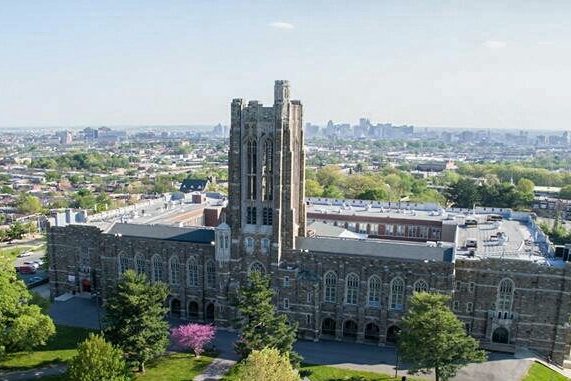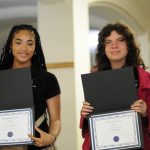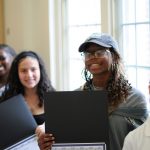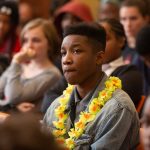“Choose someone you love, respect, or are just interested in learning more about, and ask him or her to tell you a story. Specifically, your question for them is this: Tell me about a moment when a place made a big impression on you, when it did something to shape the person you are today.”
By Ramona Pyke
When my mom was 25 years old, she volunteered for the Peace Corps in Chad, Africa where she ended up living for 2 years. Now 25 years old is kind of late to be a Peace Corps volunteer, seeing as most people go right out of college, but not for my mom. She wanted to travel and have adventures before she started her professional life, so she ended up travelling a ton in her twenties. “I didn’t want to be tied down with a full-time job, didn’t want to sit behind a desk. I just wanted to float”, she said. Her adventurous spirit ended up taking her to countries all over Europe and North Africa and eventually to the south of Chad, which changed her life.
During her two years, she lived in small village called Bessada, which she described as a a village of 3,000 people populated by a tribal group noted for their kindness. “It always smelled like cooking smoke and earth and sweat, because it was 90 to 100 degrees most days.” By Peace Corps standards, it was considered a “hardship post” because it was one of the least developed countries in the world. “No cell phones, no electricity, no running water, and only a few paved roads up near the capital,” my mom said. Just like the other villagers, she lived in a small mud hut with a high, dome-shaped thatched roof, to let the heat rise.
But it was absolutely beautiful. She described the roads as being the color of a “brick house in the rain,” and after walking on them, her feet would be covered in bright red dirt. Unlike New York City, where she lived before joining Peace Corps, there were no skyscrapers, no sidewalks, no “canyons of concrete.” Instead, there were miles of bright blue sky with white, fluffy clouds. The rainy season turned everything a lush green. The equatorial light made Chad “one of the most vivid places I’ve ever lived,” she said, “The reds were really red, the blues were really blue, the colors were so saturated compared to the pale color scheme in America.”
But one day, all of a sudden, she finally understood what all those skyscrapers and concrete in America meant.
She was a health volunteer in Chad, which meant she worked with the health team at the local clinic to talk to villagers about basic health care, vaccinations and safer sex. She lead clinics where the villagers told her about their biggest health concerns, which were usually very curable things. One day her health team was invited out to a remote village called Ta Wollo, which literally meant End of the Valley. Ta Wollo was one of the least developed villages in Chad, even more so than Besseda, so you can kind of get an idea of what it looked like.
She walked 30 minutes down a sandy path to reach her destination. When my mom arrived at the mango tree where the clinic was gathering, she looked up at all the Ronier trees (a type of African palm tree), the spindly acacia bushes, and the bright blue sky. She said in that moment, she had never felt so far from home. The villagers, many of whom were children younger than me, gathered under a mango trees (which my mom said gave the best shade) to talk about hunger. It was a particularly poor village, located way off the main road, and there were not even mats to sit on. Everyone simply squatted in the dust while they talked. They passed an old coconut seed around which acted as a talking stick. The villagers and children were talking about their biggest health concerns, which was hunger. The feeling of knowing that there is absolutely nothing to eat is something that my mother had never felt. Just like many other people, my mom had always thought of food as an expectation, but in Ta Wollo, it was not an expectation at all.
At that moment, my mom understood how lucky she was. She understood that things like skyscrapers and roads and phones and tunnels were amazing, not things to taken for granted. “They are ideas,” she said. “They started as ideas that people made happen.” In that moment, she understood that there at the end of the valley, the idea of New York or America seemed like a dream.
She also understood in that moment that these children and children all over the world need people who they can rely on. These children in Ta Wollo couldn’t rely on where their next meal was coming from. This moment in her life helped her realize that she wanted to help kids, and that’s what she did.
My mom decided at that moment that her adventures would end. Once she got back from Chad, in another 6 months she decided to use all of her advantages to make a contribution and help children. “I realized that many of the people in Ta Wollo would love the chance to see and do many of the things I always took for granted. I realized that I had unimaginable resources and opportunities in front of me.”
Sure enough, right after my mom returned from her stay in Chad, she got her law degree. Now she could have used her degree to become a big corporate lawyer, but instead she used her degree to fight for abused children. She is the voice the voiceless. She chose this path because of her experience in Ta Wollo.
Chad changed my mother’s life in two major ways. First, she came to the realization of just how privileged she was. Secondly, she clearly understood that children need someone reliable in their life to support them. She has the moment under the mango tree in Ta Wollo to thank for these life-altering realizations.




